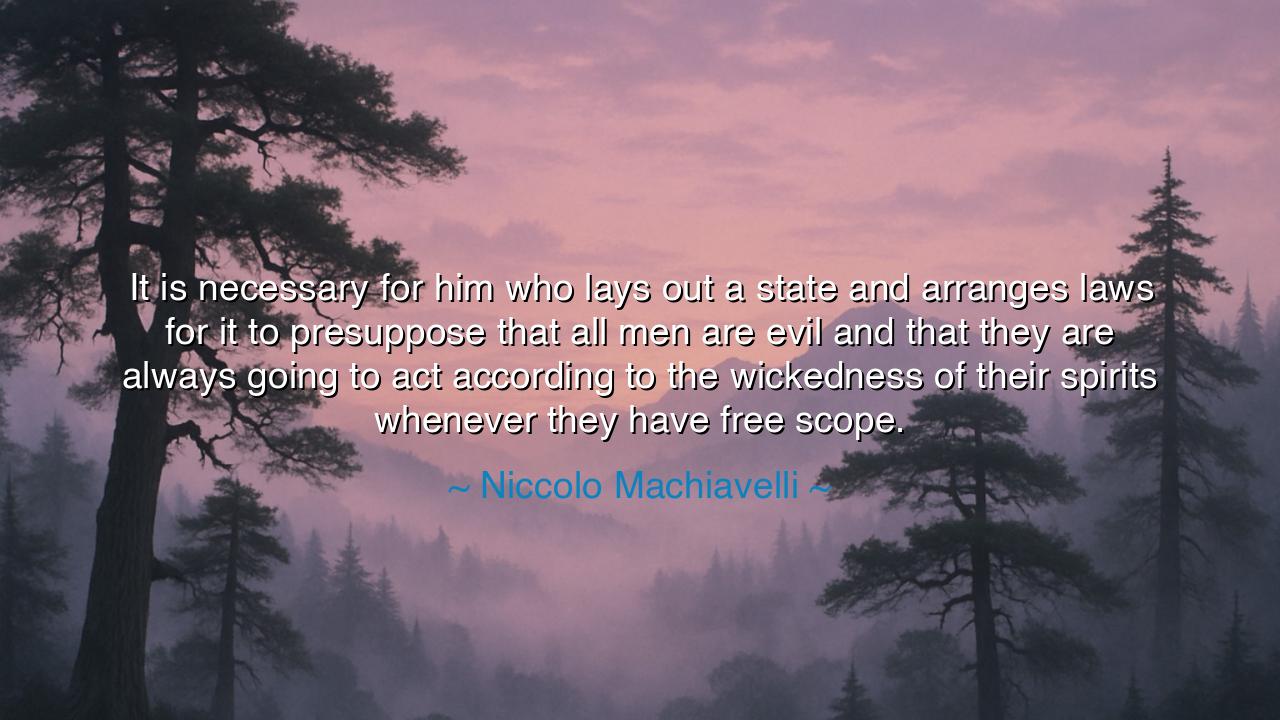
It is necessary for him who lays out a state and arranges laws
It is necessary for him who lays out a state and arranges laws for it to presuppose that all men are evil and that they are always going to act according to the wickedness of their spirits whenever they have free scope.






Hear the severe wisdom of Niccolò Machiavelli, who gazed upon the restless tides of Florence and spoke without illusion: “It is necessary for him who lays out a state and arranges laws for it to presuppose that all men are evil and that they are always going to act according to the wickedness of their spirits whenever they have free scope.” These are not gentle words to soothe the heart, but hard iron to strengthen the hand of rulers. For Machiavelli, born in an age of intrigue, betrayal, and shifting powers, understood that human beings, left unchecked, often choose selfishness over virtue, ambition over justice. Thus, if one would build a state that endures, one must begin not with hope of angelic citizens, but with sober knowledge of human wickedness.
This is not to say that Machiavelli despised mankind, nor that he denied the existence of honor or compassion. Rather, he sought to arm rulers against naivety. For he had witnessed firsthand the downfall of princes who trusted too easily, and the ruin of republics that presumed too much goodness in their citizens. To presuppose evil is, in truth, to prepare: to craft laws, institutions, and systems of accountability that restrain the worst inclinations of men while channeling their ambitions toward the common good. Thus, he declares that only through such foresight can order survive the chaos of human nature.
History confirms this harsh but enduring lesson. The framers of the United States Constitution, centuries after Machiavelli, echoed his truth. James Madison, wary of unchecked power, declared that “if men were angels, no government would be necessary.” So they built a system of checks and balances, presupposing that even the virtuous, when given free scope, could fall to corruption. Their vigilance has allowed their republic to endure through crises and tempests, precisely because it assumed weakness in human nature and sought to bind it with law.
Conversely, history also shows the tragedy of those who ignored this wisdom. The utopian societies that assumed men would live selflessly without structure often collapsed into disorder. The French Revolution began with lofty ideals of liberty and equality, but, presuming too much in the virtue of the people, quickly descended into terror, where ambition and vengeance reigned. In such storms, Machiavelli’s voice resounds across centuries: to build a state, presume corruption, and craft laws to contain it.
Yet there is also something heroic in this hard teaching. For Machiavelli does not bid us despair, but to act with vigilance and clarity. If men incline toward selfishness, then let law stand as a bridle. If ambition drives them, let institutions channel ambition into service of the state. The greatness of a lawgiver, then, is not to imagine a people better than they are, but to forge structures that make them better than they would otherwise be. It is a discipline of realism, not cynicism: a call to build upon stone, not sand.
The lesson for us is sharp and clear: in life as in politics, do not be blinded by wishful thinking. When you lay plans—whether for a family, a business, or a nation—account for the weaknesses of human nature. Expect betrayal, and set boundaries. Expect selfishness, and craft incentives. Expect ambition, and design systems where ambition serves, rather than destroys. To prepare for evil is not to abandon hope in goodness, but to safeguard the world in which goodness might endure.
Therefore, O seekers, let Machiavelli’s words stand as a warning and a guide: do not presume angels where men walk. Build your laws, your institutions, and your lives as though human frailty will always seek its advantage. In doing so, you will not fall into bitterness, but into strength. For a people who prepare for the worst while striving for the best are the ones most likely to endure—and in their endurance, to rise to greatness.






AAdministratorAdministrator
Welcome, honored guests. Please leave a comment, we will respond soon